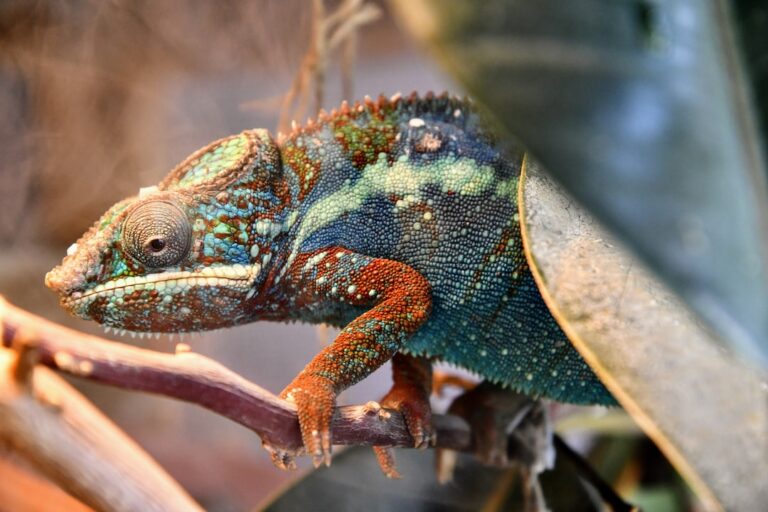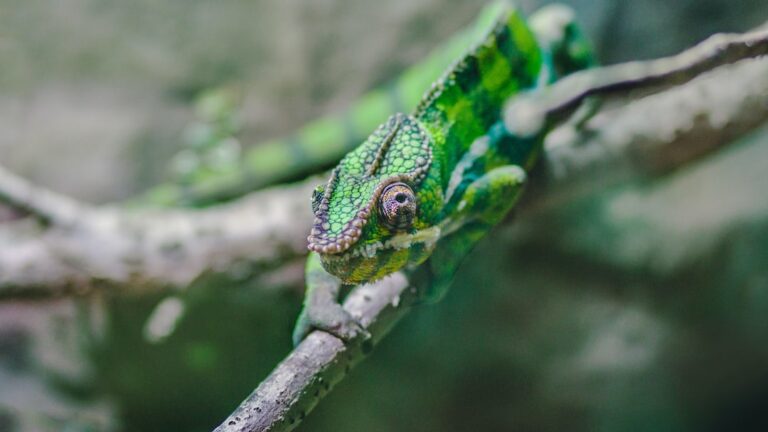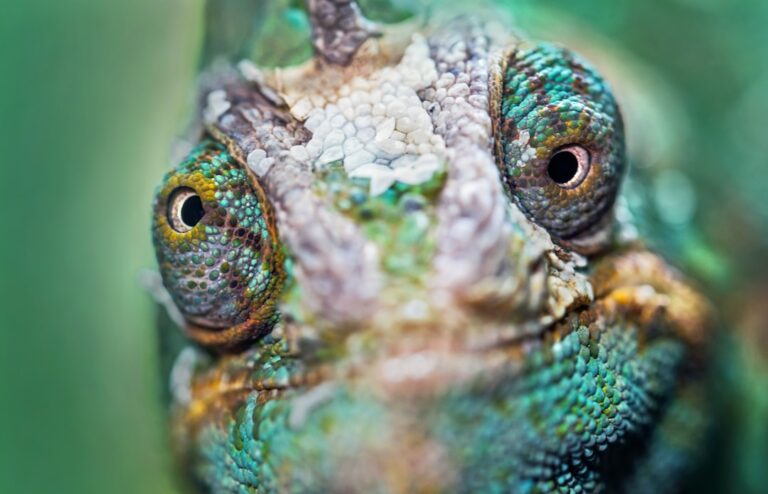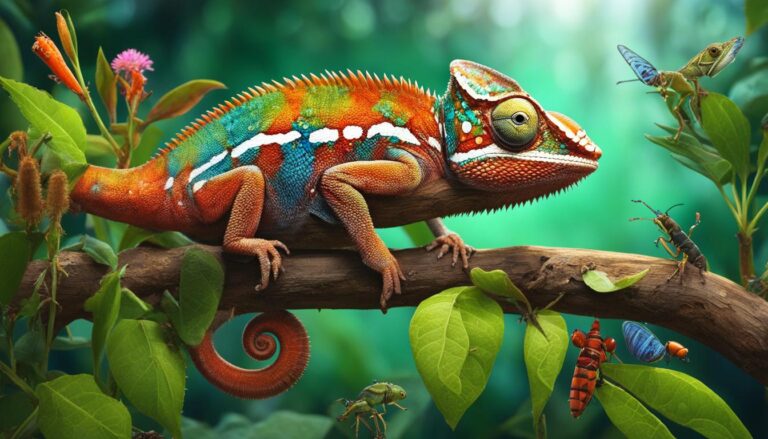Will Chameleons Overeat?
Chameleons are fascinating creatures known for their ability to change color and blend into their surroundings. They are reptiles that belong to the family Chamaeleonidae and are native to Africa, Madagascar, and parts of southern Europe and Asia. Chameleons have unique characteristics that set them apart from other reptiles, such as their independently moving eyes, long tongues, and prehensile tails.
When it comes to their eating habits, chameleons are primarily insectivores, meaning they mainly eat insects. Their diet consists of a variety of small invertebrates, including crickets, grasshoppers, flies, and worms. Some larger species of chameleons may also eat small birds or lizards. Chameleons have a slow metabolism and do not require large amounts of food to survive. They have the ability to catch prey with their long tongues, which they shoot out at high speeds to capture insects.
Table of Contents
Understanding the Risks of Overeating in Chameleons
While it may be tempting to feed your chameleon as much as it wants, overeating can have negative effects on their health. Chameleons have a small stomach and cannot handle large quantities of food at once. Overeating can lead to obesity, which can put strain on their internal organs and lead to other health issues.
Maintaining a healthy diet is crucial for chameleons to thrive. Feeding them too much can also lead to nutritional imbalances, as they may not be getting the proper nutrients they need from their food. This can weaken their immune system and make them more susceptible to diseases.
Factors That Can Lead to Overeating in Chameleons
There are several factors that can contribute to overeating in chameleons. One common factor is overfeeding by the owner. Chameleons have a slow metabolism and do not require large amounts of food. Feeding them too much can lead to overeating and obesity.
Another factor is the availability of food. Chameleons are opportunistic feeders and will eat whenever food is available. If there is an abundance of food in their enclosure, they may continue to eat even when they are full.
Additionally, stress can also lead to overeating in chameleons. Stress can be caused by factors such as improper husbandry, inadequate enclosure size, or the presence of other animals in their environment. When chameleons are stressed, they may resort to overeating as a coping mechanism.
To avoid these factors, it is important to establish a healthy feeding routine and provide a suitable environment for your chameleon.
How to Determine if Your Chameleon is Overeating
Monitoring your chameleon’s food intake is crucial to ensure they are not overeating. One way to do this is by keeping track of the number of insects you feed them each day. It is recommended to feed adult chameleons 4-6 appropriately sized insects per day, while juveniles may require more.
Another way to determine if your chameleon is overeating is by observing their behavior. If they are constantly searching for food or begging for more after they have been fed, it may be a sign that they are not getting enough or that they are overeating.
Weight gain can also be an indicator of overeating. Regularly weighing your chameleon can help you keep track of their weight and identify any significant changes.
The Consequences of Overfeeding Your Chameleon
Overfeeding your chameleon can have several negative effects on their health. One consequence is obesity, which can put strain on their internal organs and lead to other health issues such as fatty liver disease and heart problems.
Overfeeding can also lead to nutritional imbalances. Chameleons require a balanced diet to thrive, and overeating can disrupt this balance. They may not be getting the proper nutrients they need, which can weaken their immune system and make them more susceptible to diseases.
In addition, overeating can lead to digestive issues such as constipation or impaction. Chameleons have a small stomach and cannot handle large quantities of food at once. If they overeat, their digestive system may struggle to process the excess food, leading to blockages or other complications.
Tips for Preventing Overeating in Chameleons
Preventing overeating in chameleons is essential for their overall health and well-being. Here are some practical tips to help you avoid overfeeding your chameleon:
1. Establish a feeding schedule: Set specific times for feeding your chameleon and stick to it. This will help regulate their food intake and prevent overeating.
2. Use appropriate portion sizes: Feed your chameleon the recommended number of insects per day based on their age and size. Avoid giving them more than they need.
3. Remove uneaten food: If your chameleon does not finish all the insects you have provided, remove the uneaten ones from their enclosure. Leaving uneaten food can lead to overeating if they continue to eat it later.
4. Provide a suitable environment: Ensure that your chameleon’s enclosure is properly set up with appropriate temperature, humidity, and lighting. A comfortable and stress-free environment can help prevent overeating as a coping mechanism.
The Importance of a Balanced Diet for Chameleons
A balanced diet is crucial for chameleons to maintain good health. In addition to insects, they also require other types of food to meet their nutritional needs. This includes a variety of fruits and vegetables, as well as calcium and vitamin supplements.
Fruits and vegetables should be offered in moderation as treats, as they are not the main component of a chameleon’s diet. Some suitable options include dark leafy greens, carrots, squash, and berries. It is important to wash and chop these foods into small pieces before offering them to your chameleon.
Calcium and vitamin supplements are also essential for chameleons. These supplements help ensure that they are getting the necessary nutrients, especially calcium, which is important for their bone health. These supplements can be dusted onto their insects before feeding.
How to Monitor Your Chameleon’s Food Intake
Monitoring your chameleon’s food intake is crucial to prevent overeating. Here are some ways to keep track of what your chameleon eats:
1. Keep a food journal: Write down the number and type of insects you feed your chameleon each day. This will help you keep track of their food intake and identify any patterns or changes.
2. Weigh your chameleon regularly: Use a small scale to weigh your chameleon on a regular basis. This will help you monitor their weight and identify any significant changes that may indicate overeating or other health issues.
3. Observe their behavior: Pay attention to how your chameleon behaves after being fed. If they are constantly searching for food or begging for more, it may be a sign that they are not getting enough or that they are overeating.
Common Mistakes to Avoid When Feeding Your Chameleon
When it comes to feeding your chameleon, there are some common mistakes that owners should avoid:
1. Overfeeding: Feeding your chameleon too much can lead to overeating and obesity. Stick to the recommended portion sizes and avoid giving them more than they need.
2. Feeding inappropriate foods: Chameleons have specific dietary needs and require a balanced diet. Avoid feeding them foods that are high in fat or low in nutritional value.
3. Neglecting calcium and vitamin supplements: Calcium and vitamin supplements are essential for chameleons. Neglecting to provide these supplements can lead to nutritional imbalances and health issues.
4. Leaving uneaten food in the enclosure: If your chameleon does not finish all the insects you have provided, remove the uneaten ones from their enclosure. Leaving uneaten food can lead to overeating if they continue to eat it later.
Maintaining a Healthy Diet for Your Chameleon
Maintaining a healthy diet is crucial for the overall health and well-being of your chameleon. Overeating can have negative effects on their health, including obesity, nutritional imbalances, and digestive issues.
To prevent overeating, establish a feeding schedule, use appropriate portion sizes, and provide a suitable environment for your chameleon. Monitor their food intake by keeping track of what they eat, weighing them regularly, and observing their behavior.
Remember to provide a balanced diet that includes a variety of insects, fruits, vegetables, and calcium and vitamin supplements. Avoid common mistakes such as overfeeding, feeding inappropriate foods, neglecting supplements, and leaving uneaten food in the enclosure.
By following these guidelines and providing a healthy diet, you can ensure that your chameleon stays healthy and happy.
If you’re interested in the eating habits of reptiles, you might also want to check out this article on Can Chameleons Overeat?. It explores whether chameleons have the tendency to overeat and the potential risks associated with it. Understanding the dietary needs and behaviors of these fascinating creatures is essential for their overall health and well-being.







